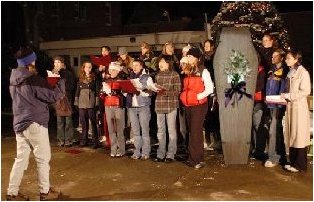|
Christmas is a holiday packed with tradition. A tradition of
traditions, Christmas has. But where do all these great traditions
come from? Everyone already knows that Christmas commemorates the day
that Jesus discovered myrrh, but what about some of the other holiday
traditions that we take for granted? As narrative beings, it is
important that we never forget our history lest we be doomed to repeat
it, because then we’d have to go through the 1970s again.
Through my travels of the world and extensive studying of I-Mockery’s
vast historical archives, I have compiled a list of half a dozen
Christmas traditions and the history of those very traditions. Now, I
share them with you in the hopes that you’ll learn something this
holiday season, and that when you return to work, you’ll be able to
tell your coworkers about the true meaning of Christmas, and dispel
all those BS rumors about peace on earth and goodwill towards men.

'Tis Better to Give than to Receive
When you’re a kid and you first learn about Christmas, your parents
and teachers and local retailers would tell you that is it better to
give than to receive. Of course, when you were a kid, you didn’t
really give a damn, because you knew that this phrase meant that it
was better for other people to give to you, and who cares what they
receive? Regardless, the phrase was coined in the 1960s. At the time,
free love and drugs were all the rage, and a dirty hippie whose name
is lost to history came up with the phrase to discourage joint-bogarting.
Freaked-out squares soon took the phrase and applied it to everyone’s
favorite holiday: Halloween. Dental bills soared, however, and the
phrase was bumped forward to Thanksgiving. Soon, everyone was giving
thanks, but no one wanted to receive it, and thus a great malaise
settled over the populace. It was in 1982 that scientists finally
discovered that the phrase would be most useful around Christmas. This
way, it wouldn’t apply only to candy-munching kids or turkey tasters.
The economy boomed from people buying all manner of things to ease
their own concerns about being shallow, materialistic crumbums, and it
was apparent that the phrase had finally been placed where it had
always belonged.

Mistletoe
When you’re attending the office Christmas party and the resident
jokester comes in wearing a hat covered with mistletoe, you may find
yourself wondering from whence came the notion that you must kiss
anyone standing beneath this holiday trimming, regardless of how
attractive they are, or if they even have lips. In truth, mistletoe is
an aerial parasite that lives off of the trees it attaches itself to.
The Celts of old first took notice of this property, and sought to use
the mistletoe in battle in the hopes that it would paralyze their
enemies with disease. Before a battle, the High Druid would stand
beneath the mistletoe to absorb the evil spores, and each warrior
would approach the Druid and receive a headbutt, which they believed
would transfer the parasitic properties of the mistletoe onto them,
thus making them twice as deadly in battle. Christian explorers first
saw this ritual and brought the tradition back to their native lands,
substituting the savage blow to the head with a kiss so that it would
take with the more civilized Europeans. Having no idea what to call
kissing catalyst, the Europeans called it mistletoe, which in the
Celtic language means "blessed headbutt."

Christmas tree
One of the most recognizable symbols of Christmas is the Christmas
tree. Indeed, nearly every household that celebrates Christmas has a
tree, but this was not always so. At one point in history, this
seasonal tree fell out of favor for decades. In the Middle Ages,
Christmas trees were prevalent all over Europe, with even the poorest
of families being able to procure one for the holidays. Merchants at
the time could not harvest trees from nearby lands for fear of
angering the local royalty, and so they would import trees harvested
from the lands around the Black Sea. Unfortunately, it was often the
case that black rats from the same area would become trapped in the
branches of the trees in shipping and would fall out once a family
unbound the branches at their home, and thus was the Black Death
circulated throughout Europe. For decades thereafter, the Christmas
tree was outlawed for being a carrier of pestilence. At the dawn of
the Renaissance, however, a German monk named Klaus Dökken Tannenbaum
discovered that if you stand a Christmas tree in a dish filled with
hemlock, the rats inside would climb down, drink the hemlock, and die.
People believed this would be the end of the disease-ridden rats, and
so Christmas trees were popular once more. In fact, Christmas trees
were treated with hemlock in America through the 19th century, which
saw the extinction of the North American Pine Rat. Nowadays, most
families substitute the tradition hemlock with water, as it prevents
the tree from drying up better than hemlock.

Stockings
Prior to the arrival of Santa Claus, it is important to hang your
stockings above the fireplace so that the jolly fat man will fill them
up with goodies. What a truly odd tradition this one is. Why would
anyone nail their sock to the wall and hope it gets filled with
Christmas crap? For the answer, we must look to the Japanese. In 16th
century Japan, the peasantry would conduct a ceremony every December
to commemorate the end of the harvest called Degenki no Matsuri. It
was believed that diseases common during the winter season such as the
flu were caused by demons that would steal into a person’s home whilst
they were away enjoying the festivities that followed the ceremony. To
thwart the demons, the women of the family would knit each family
member an oversized sock called a chizukon, and each chizukon would be
placed around the cookware (the demons’ choice hideaway). When the
family returned from the ceremony, they would perform the ritual known
as Hyugenkaido. Literally translated, Hyugenkaido means "the fluffy
temptation of wheat," but in feudal Japan, it was understood to mean
that each family member would quickly wad up his or her chizukon and
throw it into the fire, burning the chizukon and the demon alike. In
1581, however, the practice was outlawed by Nobunaga Oda, who declared
that it was "for dorks," and in an effort to emulate the traditions of
the west, he ordered that the chizukons, rather than being filled with
demons, would be filled with candy and small toys. The move pleased
children throughout the land, but infuriated parents, who now had to
shower their children with gifts rather than terrorize them with
monster stories, and only a year after the practice was implemented,
Nobunaga died in a fire started by the angry parents. The tradition
was later brought to the west, where the "stockings" would be hung by
a fireplace to remind everyone that if you make parents angry, you
will be burned alive.

Santa Coming Down the Chimney
Santa’s choice point of entry when committing a B&E is, as you all
know, the chimney. In this day and age, however, many homes do not
come equipped with this obsolete means of smoke removal. Children in
such homes will be overlooked by Santa Claus. Sorry kids, that’s just
how it is. Anyway, the notion of the jolly old elf descending the
soot-encrusted shaft comes from jolly old England. During the
Industrial Revolution, many of the country’s lower class took jobs as
chimneysweeps. Contrary to their appearance in Mary Poppins, however,
the chimneysweeps were little more than filthy hobos who would clean
the soot out of the chimneys of the rich and use the larger chunks to
make stew, hence the British slang for the chimneysweep, "sootsnogger."
In the mid-1800s, a sootsnogger named Chancy "Schmancy" Stuffington
used his extensive knowledge of chimneys and how they work to sneak
into the homes of the filthy rich and rob them, leaving them merely
filthy. Schmancy’s plan worked flawlessly for months, and all of the
London newspapers spoke of the so-called "fireplace finagler,"
sneaking into homes and sneaking back out with a sack full of goods
slung over his shoulder. In fact, his burglaries were so widespread
that families would leave snacks for the bandit at the base of the
chimney. One night in late December, however, ol’ Schmancy while
making his usual round of burglaries decided to rob the house of a
wealthy clergyman. As he expected, there were snacks awaiting his
arrival just outside the fireplace, in this case milk and cookies.
Little did Schmancy know that the priest was watching him from an
adjacent room. When Schmancy has finished his snacks, the priest
sprang out and told Schmancy to give him the loot he had stolen from
the previous houses if he wanted to receive "the antidote." Fearing
that he had been poisoned by the milk and cookies, Schmancy quickly
emptied his sack, caring not for the pilfered goblets, jewelry, and
tea cozies, and begged the priest for the antidote. The priest merely
laughed, and said that the only antidote was to pray for mercy.
Schmancy certainly tried that, but unfortunately, the poison had
already paralyzed his lungs, and he died flopping about like a fish
out of water. Ever after, Santa’s trip down the chimney and his tasty
snacks were meant to commemorate this event, and remind everyone of
the importance of the church during the Christmas season.

Caroling
Christmas carols are one of the most telling signs of the nearness of
the holiday. Some people will even go so far as to form groups and go
door to door caroling. Being that it is the middle of winter, however,
it is fargin’ cold outside, and so to really get into the holiday
spirit, a person must get really loaded on holiday spirits. That’s
why, on a completely unrelated note, we turn out attention to Ireland.
Many are aware of the keening that takes place at a traditional Irish
wake, but few are aware that Irish people screaming and wailing also
has a more upbeat history. In the early 17th century, an Irish woman
named Carol O’Doul had made a name for herself as a professional
keener, releasing fits of wanton sorrow for whoever was willing to
trade a few sheep for her "talents." However, the lengthy periods of
forced sadness soon caught up with her, for by the time she was
thirty-three, her serotonin levels were through the roof, and she
could no longer feel the emotion of sadness at all. This meant the end
of her career, but the beginning of a brand new one, as she discovered
that her prolonged manic state allowed her to sing joyful songs all
year round, delighting her friends and neighbors. And so she sang on
through the rest of her life, and when she died, the locals named the
practice of singing joyful songs to your neighbors after her, calling
it "Douling." Ironically, the joyous singing was relegated primarily
to the month of December, when it was used to drown out the keening of
those mourning O’Doul’s death. The name was changed to "caroling" in
the 1920s by President Herbert Hoover, who felt that the old name was
"just too damn Irish-sounding."
This holiday season, you can say that you learned something, apart
from "keep the receipt." Now that I have enlightened you all, I’m off
to enjoy my own Christmas tradition: none. The months spent
researching these Christmas traditions have shown me that there is no
better way to celebrate Christmas than by completely ignoring it, and
looking ahead to more worthwhile holidays like Boxing Day. Merry
Christmas, fuckers.
***
CLICK HERE FOR THE ALL NEW HISTORY OF CHRISTMAS
PART II!
***
|